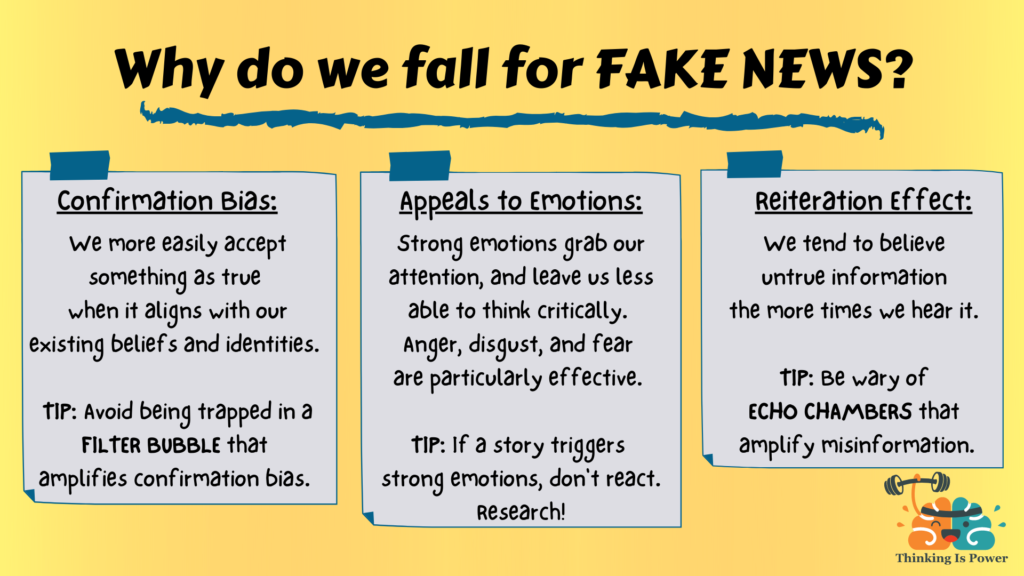Fascination About Pr
Wiki Article
10 Simple Techniques For Www.jimplacknews.com
Table of ContentsThe smart Trick of Https://www.jimplacknews.com/ That Nobody is Talking AboutLittle Known Facts About Https://www.jimplacknews.com.Unknown Facts About Www.jimplacknews.com/
The very best method to respond to fake information is to conduct your own study. With this guide, you'll find out the fundamentals regarding false information and also fake information, how to review resources of info, where to discover trusted info, and also where to seek fact-checking devices. False information Interpretation: What Is It and also Why Is It a Problem? By its most basic definition, false information is wrong or deceptive details.Misinformation isn't just incorrect or deceptive details it's incorrect info that individuals spread out regardless of whether there is intent to misdirect. This new interpretation make up the reality that several individuals who share false information online do not recognize it's misinformation, as well as they're not sharing it with malicious or uncertain intent.
Misinformation vs. Disinformation False information and disinformation are terms that may seem compatible. Unlike misinformation, which individuals spread out without recognizing it's false, disinformation is incorrect info that people spread out with complete knowledge of its mistake.
Urban legends are examples of false information. Several people spread out city legends thinking they're real, or at the very least there's a shred of reality to them.
The Best Guide To Jim-plack-news
At some point, 2 kids asserted that Slender Male required them to try to commit murder. Since false information can be much more widespread and also tougher to detect than disinformation, this guide concentrates on misinformation. Nevertheless, maintain in mind that the fact-checking techniques below can also be used against disinformation. The Spread of Misinformation and also Phony Information Split second interaction as well as social networks have actually made it easier than ever before for people to connect with each other, despite time or place.Research study shows that Facebook customers involve with false information which commonly takes the type of fake news 70 million times monthly generally. This is a decrease from the 2016 peak of 200 million month-to-month fake news engagements, yet still no small figure (useful reference). On Twitter, people share false content 4 million to 6 million times each month, a figure that has not declined considering that the 2016 political election.


The 5-Minute Rule for Press Statement
It isn't constantly promptly clear which web sites and articles are reputable. A certain site might appear credible to one individual, however not to an additional. There are six standards you can utilize to evaluate an internet site:: The web site needs to have contact information, developer/owner details, as well as author credentials/qualifications. this page.: The website's purpose must be clear, with articles that match its stated function; you can take a look at the domain name's LINK to help determine objective.Links to details resources must be appropriate and up-to-date. Accurate claims need to hold up as true when you check them versus independent sources.
spelling mistakes, grammatical errors, headlines that don't match the content topic) such that go to website it's clear there's no content oversight? Or is there a reasonable level of quality? Is the website's web content doubtable, acquired, and repeated, or is it genuine? If it's an information resource, can you discover posts that have been changed to deal with imprecise statements or typos? Does the site have any initial sources of info or does it only link out? For original resources, does a search on a reliable online search engine disclose the credibility of the person or company? What is the person or company's objective? Are the photos on the site low-grade and also spammy, or do they connect and also add directly to the material's topic? Does the site identify its target market? Can you quickly look the website by means of onsite online search engine? Does the site have a legitimate protection certification!.?.!? Do the website editor's respond when you contact them? Do attempts to gain access to web content regularly cause redirects? Is the site typically down and not working effectively? Do links typically bring about dead pages? You don't have to answer every one of these inquiries, yet even trying to answer several of them can put you on the appropriate track to figuring out a site's reliability.
Listed below, you'll find some of the largest questions to address in your search for the truth. Is the Case Believable? Initially, think about the insurance claim itself: does common feeling tell you it's credible or reasonable? Information can be surprising or unexpected, however a headline needs to have a reasonable degree of believability.
Report this wiki page